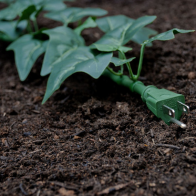
Reducing your family’s exposure to pesticides extends beyond purchasing organic food and frequenting the farmer’s market. Our every-day exposure to pesticides and harmful chemicals often comes from our household items and personal care products.
Children in particular are at greater risk for being exposed to pesticides. The Environmental Protection Agency recognizes that children’s internal organs are still developing and maturing and their immune systems provide less natural protection compared to adults. Scientists have linked exposure to pesticides found in the home to adverse health effects including cancer, ADHD, autism, asthma, food allergies, hormone disruption, and birth defects.
Keep your home safer and reduce your family’s exposure to harmful pesticides with the following tips:
- Banish triclosan: Found in most of our household soaps and sanitizers, triclosan is a neurotoxin found by the Center for Disease Control in 75 percent of people tested for the carcinogen. Check the labels of your cleaning products, toothpastes and soaps for this ingredient. Stick to all-natural soaps and detergents whenever possible.
- Dust clean: Our homes are hubs for toxic exposure from the sealants used in the walls, to the paints, and debris we bring in from our shoes. Maintaining a clean and health home is extremely important. Indoor dust has been found to contain arsenic and lead. But don’t get clean with toxic supplies. Mix up your own solutions with vinegar and water, or lemon oil and olive oil for a natural clean. Or opt for natural cleaning products like Method, Seventh Generation or Mrs. Meyers for daily maintenance.
- Clean your water: Our water is tainted with pesticides and a number of potentially toxic organisms. Use filters whenever possible before drinking. You can even purchase special filters for the shower.
- Ditch insect repellants: Insects are a bother but so are toxic sprays, repellants and chemicals to keep them at bay. Get rid of ants in your home with boric acid, a nontoxic alternative. Ditch mosquito repellent which contains the harmful chemical DEET linked to birth defects, and chose oil of lemon eucalyptus or picaridin (derived from pepper) as a replacement.
- Green apparel: Our clothing is full of toxic pesticides, dyes and cancer-causing chemicals. Clothing lines Zara, H&M, Calvin Klein and many more came under scrutiny this year for the chemicals found in their clothing (which they plan on phasing out). In the meantime, stick to organic materials and purchase apparel from companies known for their commitment to safe and fair manufacturing processes such as FashoningChange.com, PureCitizen.com or Indigenous.com.
How do you currently make sure your home is pesticide-free?







This article is very informative and useful. Thank you for sharing it with us 🙂
This article is very informative and useful. Thank you for sharing it with us. 🙂
Thanks for this informative tips. Any tips for all natural pest control?
Fantastic. Food for thought! I am not a bio person but maybe should be more aware for the sake of my kids. Life has changed somewhat since i was young 🙂
Thanks for sharing this information. It is particularly important during the summer season to find DEET-free insect repellents like EcoSmart, Buzzaway Extreme, All Terrain Herbal Armour and Purple Praire Sun Stuff.
Great tips that will keep me and my family away from pest and the danger that it may give to our health and also to our house. Thank you for sharing this simple and informative tips.
Thank you so much for the great information! I will try my best to apply as much of these tips as possible in my everyday life.